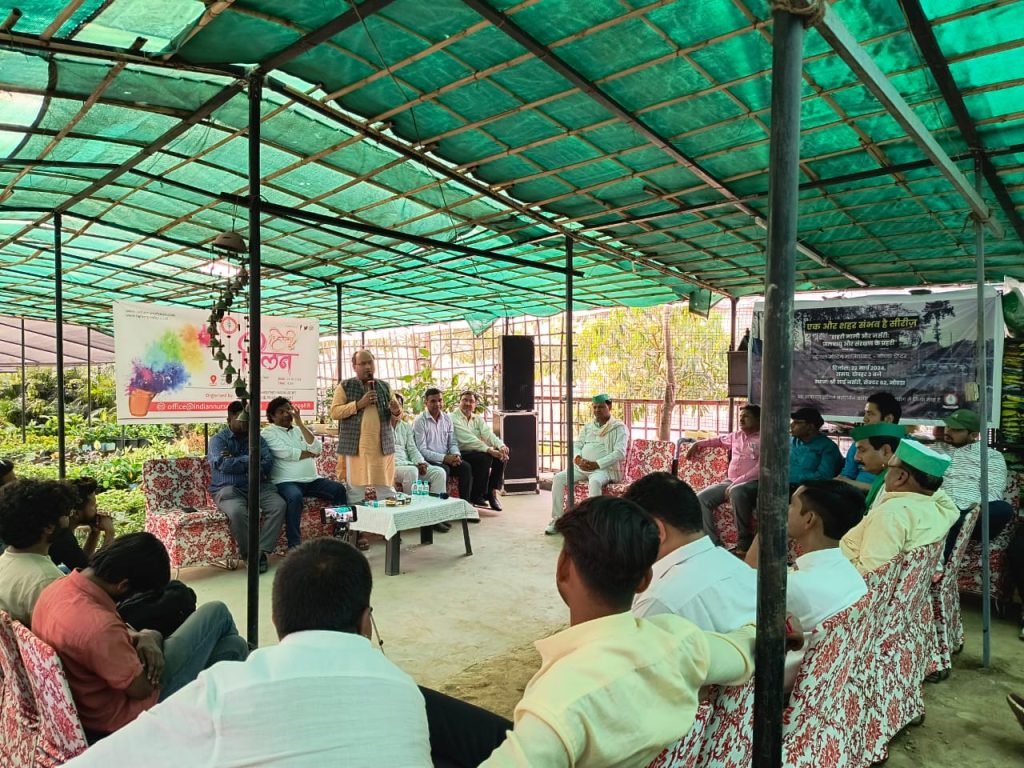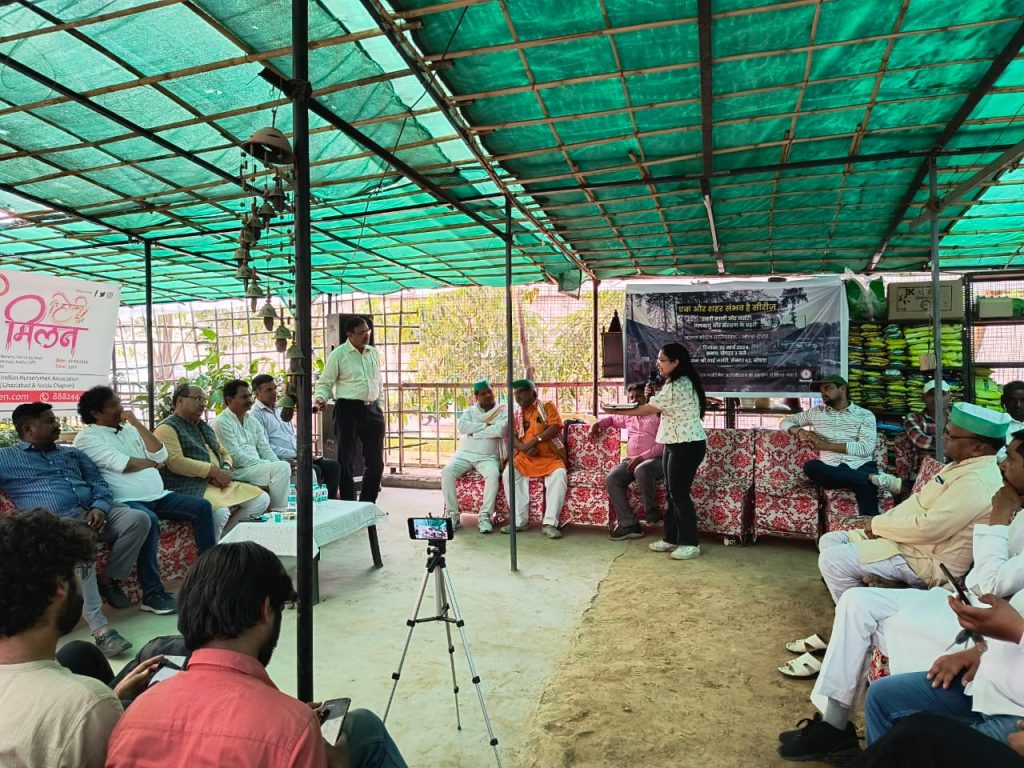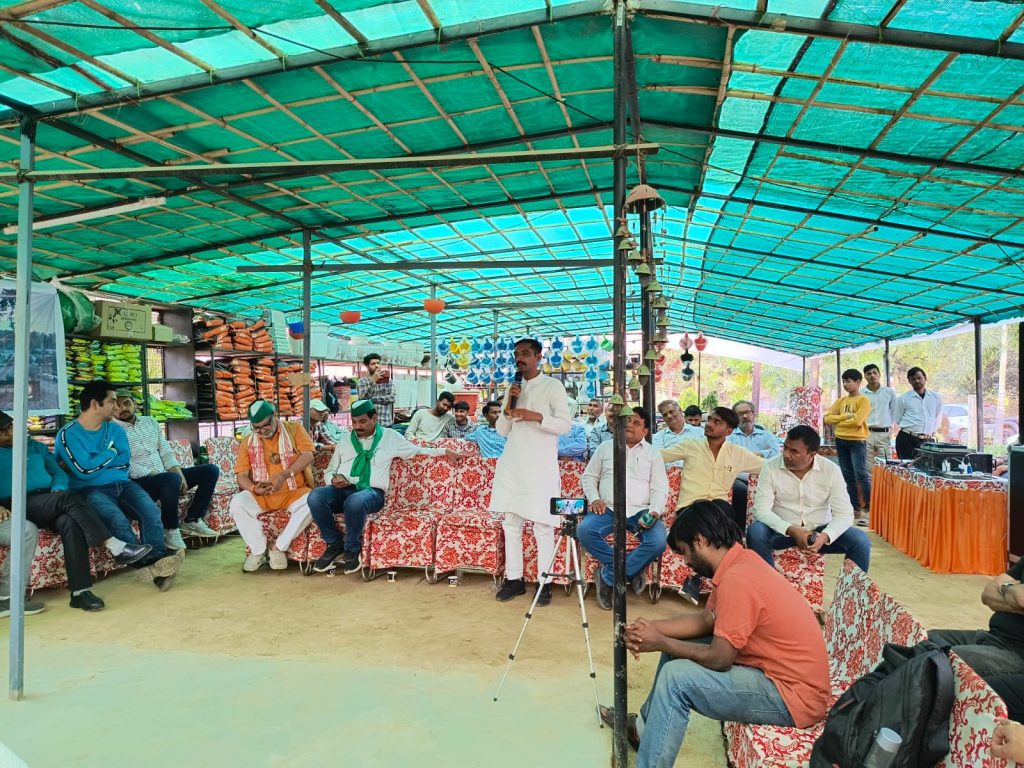Building on the momentum of the well-received Another City is Possible: Nurseries and Maalis edition, the initiative embarks on a new chapter. As envisioned in collaboration with the Indian Nurserymen’s Association (INA), we delve deeper into the National Capital Region (NCR) through a series of zonal meetings. These targeted gatherings plan to address the needs and challenges of local nurseries in specific zones.
Focused on smaller groups, the public meetings with local nurseries aim for nuanced insights into the structure, operations, and challenges. The first of the region-specific meetings occurred in the Noida Ghaziabad Chapter of INA, led by regional President Manoj Bhati and General Secretary Sanjay Tyagi. Mukul Tyagi, General Secretary of INA, moderated the event held in the presence of prominent figures like Y. P. Singh (President, INA), Mukesh Sharma (Joint Secretary), and C. Gopinath (Treasurer, INA). In addition to members of the Indian Nurserymen’s Association (INA), the meeting included representatives from various sectors like landscaping, social work, and farmer’s associations.

The meeting began with introductions from nursery owners, followed by an introduction to the event by the representative from the People’s Resource Centre (PRC) for an elaborate description of background information on the organization’s mission to connect with stakeholders and explain the purpose and structure of the ‘Another City is Possible’ series.
Ownership & Land Authorization
A recurring theme during the public discussion was the issue of land ownership and authorization faced by nurseries. Participants highlighted the following problems: encroachment concerns, bureaucratic delays, policy ambiguity, political influence, and others.
Owners face difficulties obtaining authorization for their nurseries, with no guarantee of permanent ownership. This temporary status leaves them vulnerable to eviction at any time. Compounding the problem is the threat of intrusion where nursery owners recalled a specific incident on April 1, 2021, when the encroachment was evident at the hands of authorities.
While meetings with officials are achievable in times of distress, stakeholders experience frustration with the bureaucratic maze. Files get shuffled between departments, and there seems to be a lack of a regulatory system. Devoid of policies, the situation turns vulnerable with no comprehensible means to address the grievances effectively.

Y.P. Singh (President, INA) even pointed out that Noida previously offered 21-year authorization periods. But, due to a lack of unity among nursery owners and their representatives regarding policy development, the authorization period has been reduced to just five years. Essentially, there is an emerging trend for elections to favor politicians with limited environmental knowledge, leading to a disregard for established regulations. Consequently, administrative procedures become entangled in political maneuvering. In contrast, the nursery industry is vital in greening cities, a task of ever-growing importance. As environmental issues become unavoidable realities in our lives, it’s crucial to listen to the demands of those actively working to improve urban ecology.
Regional Adaptability
Understanding the specific needs of urban greening is critical for long-term success. A solution-oriented approach, coupled with environmentally conscious research becomes essential to meet the growing demand for nurseries and their services within cities. This includes carefully considering which tree species are best suited for different urban environments to avoid the pitfalls of unplanned greening efforts.

In this context, one of the nursery owners from the Noida-Ghaziabad Chapter of INA highlighted the importance of regional adaptability, citing the example of Aambar Bel trees in Noida. These trees were not being cared for in a way that considered their specific regional needs. Holistic guidelines on appropriate plant selection for different areas would empower nursery owners to cater to sustainable urban greening practices. This, in turn, would promote a more productive and balanced urban ecology.
Organization & Mobilization
A key component of the nursery functioning is associated with labor-intensive jobs of upkeep, weeding, watering, and sales amongst others. In the previous meeting, the issue of a lack of skilled labor or trained labor was one of the pressing concerns highlighted by the representatives. A similar sentiment made its way into the discussion at the Ghaziabad-Noida chapter as well wherein the suggestion of a formalized portal for the maalis or labor working on the nurseries and those seeking opportunities in the avenue could be explored, it was recommended that an app or portal be set-up for the same to facilitate the hiring and employment of labor.
Further, regarding grievance redressal in the Ghaziabad-Noida chapter, a reverberating view has been on the insistence of mobilization of the INA members. Drawing from the experiences of the Bharatiya Kisan Union (Annadata) members who were also present at the meeting, the panel of INA office-bearers emphasized that for change to occur, they must have adequate representation to urge the administration to action. Y. P. Singh reiterated that when the isolated flower mandis operating in Mehrauli, Fatehpuri and Connaught Place can be grouped and allocated a space in the urban infrastructure – operating as the Ghazipur Flower Mandi, the largest flower market in Delhi– the members of INA must unite and through organizational strength put forth their demands for redressal, as a lone representative the president cannot bring change.
Mr. C. Gopinath (Treasurer, INA) added that an issue that compounds this problem is that of unregistered nurseries operating in the vicinity of the registered ones. Sharing his personal experience in Tamil Nadu, he explained that a recent flooding instance led to losses in the nursery premises. When the aggrieved approached the authority for compensation, they were asked to bring representatives from the affected nurseries which led to the revelation that only 3-5 nurseries were registered amongst the plethora of nurseries functional in the area.
Horticulture Department & Recreation

When asked about the sectoral benefits that the nurseries receive, Y.P. Singh said that horticulture is a branch that falls in the ambit of agriculture, and while the nursery profession is also related to environment and hobby, the profession is also taken up for one’s mental peace in the hustle and bustle of our lives in the modern age surrounded by gadgets and screens. However, the city lacks specialized horticulture schemes for the people operating garden centers in urban spaces. He clarified, the cities only have functional garden spaces and not nurseries, that is why the benefits of horticulture schemes does not translate to the current work environment in the city-spaces. While garden centers provide the necessary knowledge, equipment and resources such as consultancy to the people in urban spaces, which help the nurseries to grow, due to the sphere being bereft of schemes for them, the profits and demand surge that they noted during the COVID era, has not been able to sustain itself despite it being a multi-million-dollar industry.
Report prepared by Vibhuthi Bhardwaj (Research Assistant) and Aishani Puri (Research Intern)

